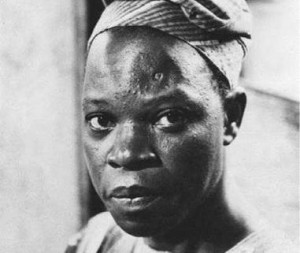
Amos Tutuola; (1920-97) Novelist counted among a unique group of mythmakers who deployed significant aspects of oral tradition not just as a flowery tribute to literary distinctiveness, but as a culminated contribution to the Nigerian literary space with both a didactic and functional signature. Tutuola is known for novels that chronicle tales of marvels and magic. His stories incorporated Yoruba myths and legends into loosely constructed prose epics that improvised on traditional themes. Unlike D.O. Fagunwa, Tutuola wrote largely in English and is also a major reference point in the canons of Nigerian Literature in English. One of Tutuola’s greatest charms was his language. He wrote in a way that made his language appear uncorrupted by western literary gimmicks. The words read quickly like some terse, simple narratives, but the impact sinks almost as original and poetic. The Nigerian professor, Morals Ogundipe-Leslie noted of Tutuola’s language: ‘He has simply and boldly (or perhaps innocently) carried across into his English prose the linguistic pattern and literary and the rest of the world performing plays.
He is basically speaking Yoruba but using English words. His works articulate a unique example of a hybridized interface between Nigeria’s pre-colonial oral folklore and literary modes of discourse. The Palm-wine Drinkard (1952) is his most famous literary work, a classic quest tale that was the first Nigerian book to, in a sense, achieve critical acclaims and international fame. The story tells the mythological story of a man who follows a palm wine tapster into the land of the dead or ‘Deads’ Town.’ Here, the man encounters the familiar elements subsumed in the folktale narrative: the world of magic, ghosts, demons and supernatural beings. Some of his other works include: My Life in the Bush of Ghosts (1954), Simbiand the Satyr of tlte Dark jungle (1955), The Brave African Huntress (1958), etc. The relevance of Tutuola seems obvious considering his important contributions to the preservation of the structure of the oral tale in modern Nigerian Literature[i].
[i] NATION December 10, 2014





















